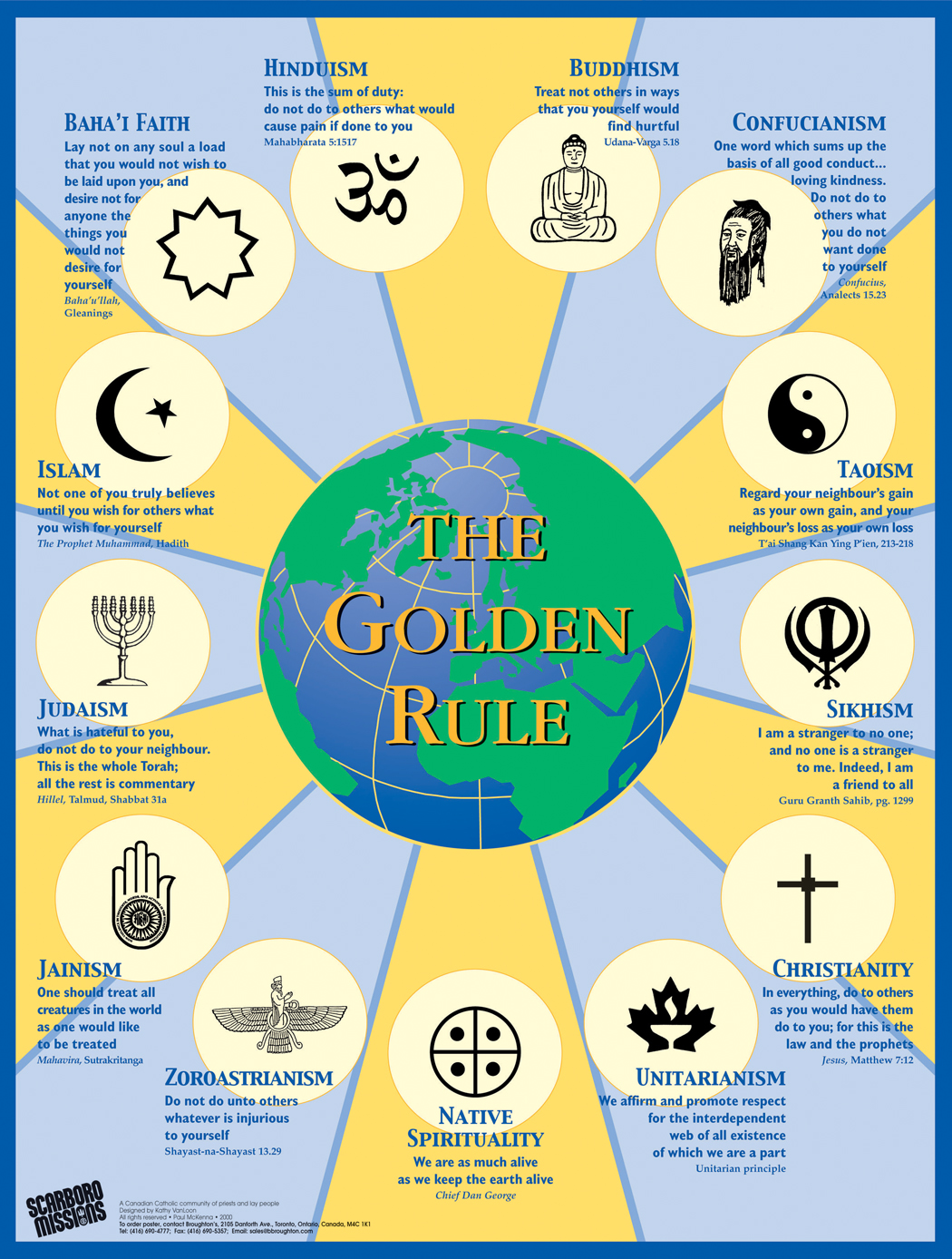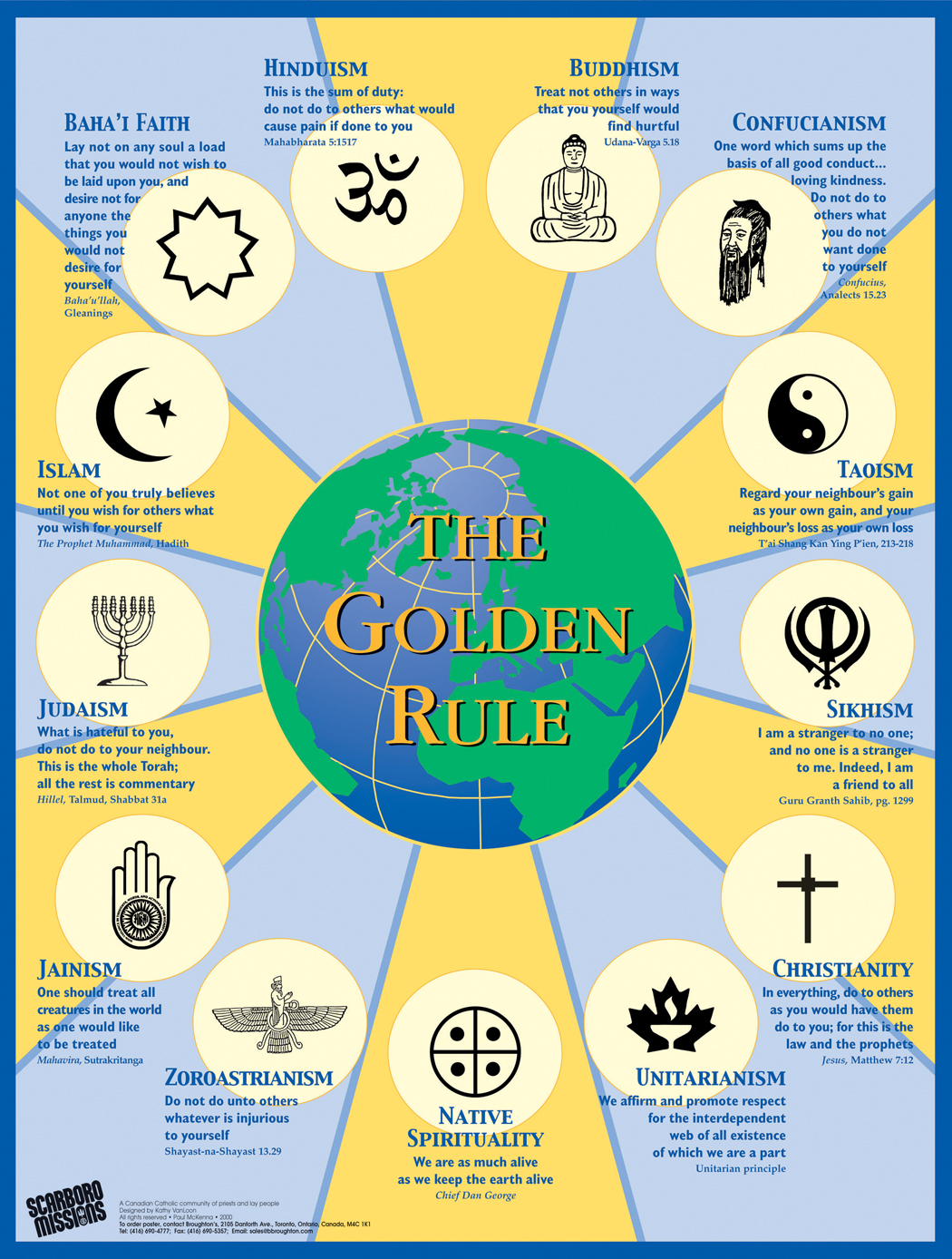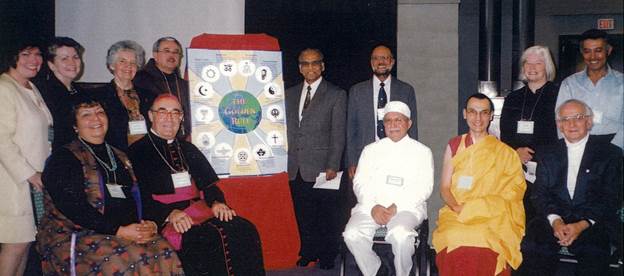Interfaith Golden Rule Poster
Published by Scarboro Missions

The Scarboro Missions Golden Rule poster which features the golden rule in 13 religions has been translated into a number of languages.
Here are links to the Poster in other languages.
Spanish Golden Rule Poster (free online)
French Golden Rule Poster (free online)
Hebrew Golden Rule Poster (free online)
Turkish Golden Rule Poster (free online)
Slovenian Golden Rule Poster (free online)
Amharic Golden Rule Poster (free online)
Urdu Golden Rule Poster (free online)
German Golden Rule Poster (free online)
Flemish Golden Rule Poster (free online)
Italian Golden Rule Poster (free online)
Bilingual Golden Rule Poster – French & English (free online)
Portuguese Golden Rule Poster (free online)
Japanese Golden Rule Poster (free online)
Australian Golden Rule Poster
Scarboro Missions is a Partner Organization of ProgressiveChristianity.org
Understanding the Golden Rule
Ethic of Reciprocity
The Golden Rule, known also as the Ethic of Reciprocity, is arguably the most consistent, most prevalent and most universal ethical principle in history. Many regard it as the most concise and general principle of ethics.
The Golden Rule is found in numerous cultures, religions, ethical systems, secular philosophies, indigenous (Native) traditions, and even in the mathematical sciences (e.g. the golden mean). And because it crosses so many traditions and philosophies, the Golden Rule possesses tremendous moral authority and reveals a profound unity underlying the diversity of human experience. The Golden Rule also emphasizes values of mutuality, interdependence and reciprocity.
Given its omnipresence across history, the Golden Rule is often described as a universal ethical principle. To reflect on the Golden Rule is to reflect from the perspective of a universal wisdom. Accordingly, the Golden Rule is not just a moral ideal for relationships between people but also for relationships among nations, cultures, races, sexes, economies and religions.
The Golden Rule, with roots in a wide range of the world’s religions and cultures, is well suited to be a standard to which different cultures could appeal in resolving conflicts. As the world becomes more and more a single interacting global community, the need for such a common standard is becoming more urgent. Clearly, the Golden Rule has the capacity to be the ethical cornerstone as the human family works together to build a peaceful, just and sustainable global society.
Its appeal is augmented by the fact that its message is simple, universal and powerful. In July 2000, Scarboro Missions published the Golden Rule Poster featuring the Golden Rule in 13 religions in a striking and attractive 4-colour format. Scarboro Missions has been stunned by the success of the poster – this piece of multifaith art is making its way around the world. Everywhere it goes, it performs its magical task of healing, unity and reconciliation.
Statement from Jeffrey Wattles
Jeffrey Wattles is a philosopher who teaches at Kent State University in Ohio, USA. Wattles has published one of the best books ever written on the Golden Rule (“The Golden Rule” Oxford Press, 1996). The two-page conclusion of Wattles’ book is an excellent statement about the meaning of the Golden Rule. We are privileged to reprint it here (with permission of author). To facilitate the reading of the Statement, two sub-headings have been added:
The Golden Rule is, from the first, intuitively accessible, easy to understand; its simplicity communicates confidence that the agent can find the right way. The rule tends to function as a simplified summary of the advocate’s moral tradition, and it most commonly expresses a commitment to treating others with consideration and fairness, predicated on the recognition that others are like oneself.
The Golden Rule is offered to those among whom a minimal sincerity may be presupposed – the hearer will not manipulate the rule in defense of patently immoral conduct. The Golden Rule is not best interpreted as an isolated principle in a value vacuum, to be examined as a candidate for the role of sole normative axiom in a formalized ethical theory. Nevertheless, the rule is a principle in a full sense.
Even before it is formulated, its logic operates in the human mind. Once formulated, it shows itself to be contagious and quickly rises to prominence. It functions as a distillation of the wisdom of human experience and of scriptural tradition. It serves the needs of educated and uneducated people alike, and stimulates philosophers to codify its meanings in new formulations. Given the equal, basic worth of each individual, the rule implies a requirement of consistency; as philosopher Samuel Clarke puts it: “Whatever I judge reasonable or unreasonable for another to do for me; that, by the same judgment, I declare reasonable or unreasonable, that I in the like case should do for him.” In addition, this principle of a philosophy of living carries implications for social, economic, and political realms.
An Expression of Human Kinship
Much of the meaning of the rule can be put into practice without any religious commitment, since it is a nontheologic principle that neither mentions God nor is necessarily identified with the scriptures or doctrines of any one religion. The rule is an expression of human kinship, the most fundamental truth underlying morality. From a religious perspective, the Golden Rule is the principle of the practice of the family of God, and it means relating with other people as a brother or sister. At the limit, it involves conduct patterned on a divine paradigm, extending to others the same attitude of service that one would welcome as the recipient of someone else’s divinely parental love in the same kind of situation.
The rule cannot be captured in a static interpretation for it engages the thoughtful doer in a process of growth. To follow it to the end is to move from egoism to sympathy, to sharpen moral intuition by reason, and to find fulfillment beyond duty-conscious rule following in spontaneous, loving service. In the process of identifying maturely with others, adopting the other’s perspective imaginatively may be helpful, along with every other technique of understanding and cooperating with others. Thus the unity of the rule, amid its wide diversity, is its life as a symbol of this process of growth.
Identifying with Others
Whoever practices the Golden Rule opens himself or herself to a process of change. Letting go of self to identify with a single other individual, or with a third-person perspective on a complex situation, or with a divine paradigm, one allows a subtle and gradual transformation to proceed, a transformation with bright hope for the individual and the planet. The rule begins by setting forth the way the self wants to be treated as a standard of conduct; but by placing the other on a par with the self, the rule engages one in approximating a higher perspective from which the kinship of humanity is evident. To pursue this higher perspective is to risk encountering the divine and the realization that every step along the forward path is illumined by the Creator….
Confronting the problems of modern civilization, superficial thinking looks for a panacea. A simple word of wisdom, however, cannot help with a complex problem unless its simplicity expresses a life that comes from being connected with a universal network of truths. The more deeply the Golden Rule is grasped, the less it seems an easy answer. But those who learn to practice it fully, conjoining material sympathy with moral reason under the guidance of spiritual love, will point the way toward a brighter future.
“Do to others as you want others to do to you” is part of our planet’s common language, shared by persons with differing but overlapping conceptions of morality. Only a principle so flexible can serve as a moral ladder for all humankind.
(End of Jeffrey Wattles’ Statement)
MORE INFO HERE


